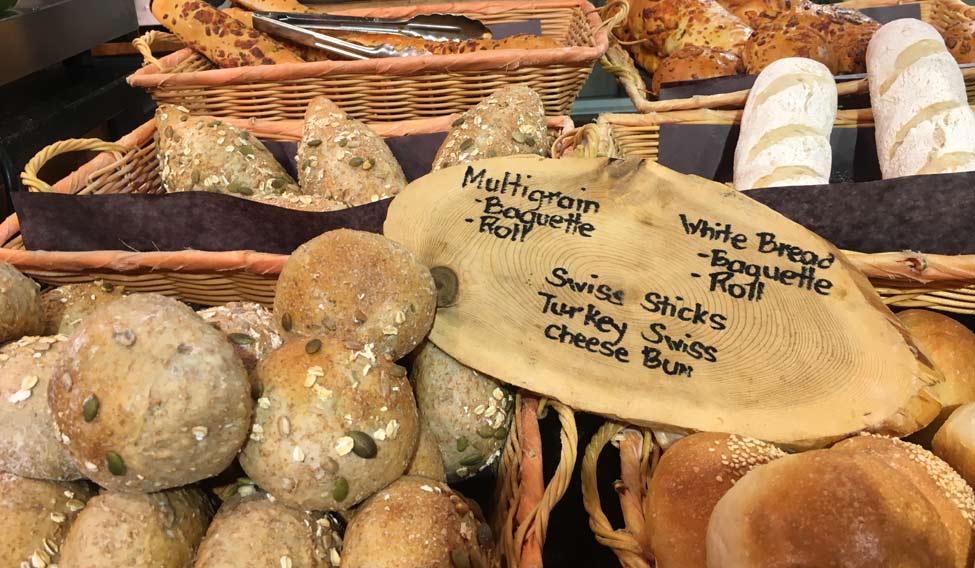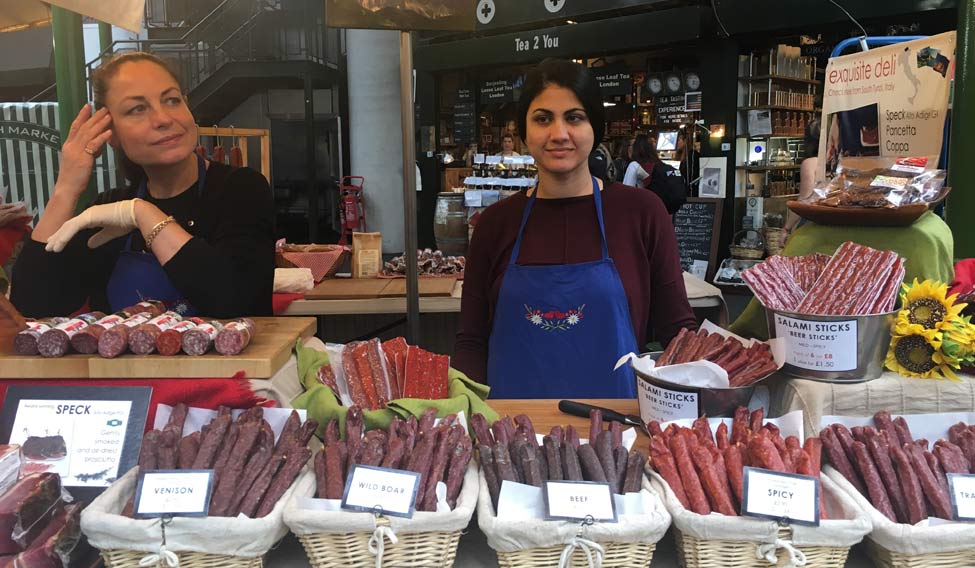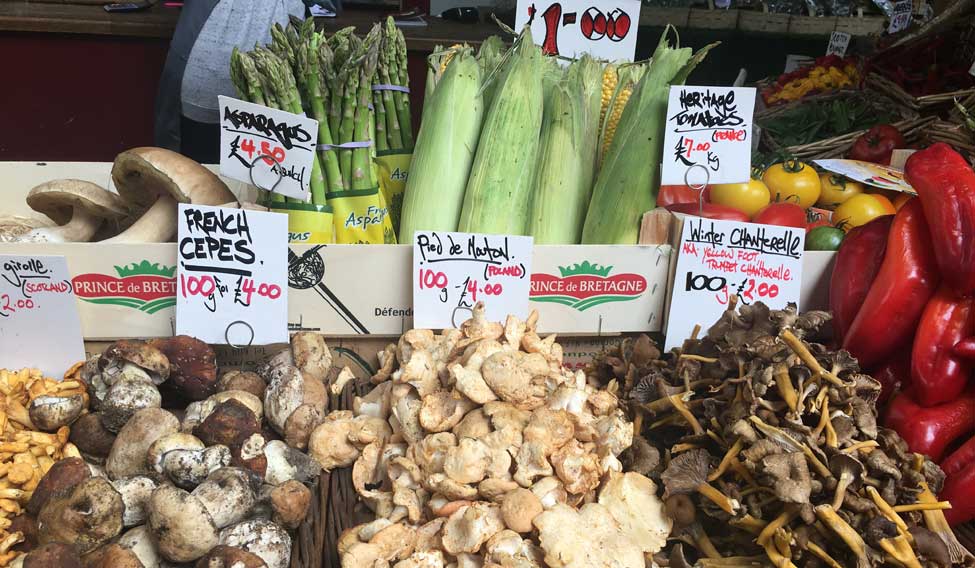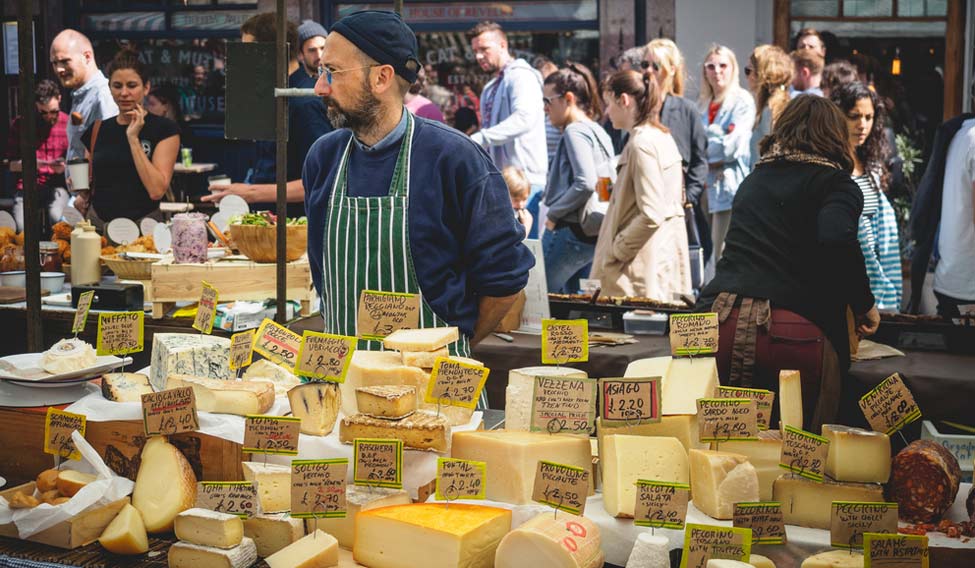London's atmospheric farmers' markets are a sensory feast. Brimming with fresh produce—fruits, vegetables, seafood, artisan breads, cheeses, juices and delicious, freshly prepared food—they also offer tastings, shopping opportunities as well as a chance to engage with passionate food producers and farmers. What's not to love?
The Berwick Street Market, Broadway Market, Brockley Market, Camden Lock Market, Chapel Market—the choice too is mind boggling. These markets have also been spearheading London's street food revolution and are a great way to discover and appreciate the origin and quality of good food.
My favourite though are the food stalls. Barbecues sizzling with plump sausages, crispy bacon and succulent meat patties, food vendors hollering out good-naturedly to punters to sample their fare, drink stalls dispensing everything from Moroccan mint tea to froth-topped smoothies to chai lattes and cappuccinos, there's a scintillating smorgasbord on offer.
On a recent trip to the capital city of the Old Blighty, I embarked on a market trail of three of its most iconic farmers' markets. I began with the Camden Market that is recognised as one of the world’s most famous markets today. Never mind if it began as a tiny cluster of craft workshops by the Regent’s Canal in 1974.
 The Camden Market is one of the world’s most famous markets | Neeta Lal
The Camden Market is one of the world’s most famous markets | Neeta Lal
Camden is also a Mecca of artisan creativity and trading. Every year, it receives a footfall of 28 million, visitors who come to this waterside retail site to soak up its unique atmosphere, stock up on the eclectic wares on sale and engage with a diverse community of sellers, street food traders and independent store owners.
I face the problem of plenty as I prepare to browse through some of the over 1,000 places to shop, eat and drink here. Traders tell me the market has been a favoured haunt of celebrities like Mick Jagger, Bob Dylan, Bette Midler, Eric Clapton, Barbara Streisand, David Bowie, Naomi Campbell, Giorgio Armani, Boy George and Sir Paul McCartney. Late singer Amy Winehouse worked here at a stall as a teenager.
The place has plenty of loyalists. "Talking to the farmers and food producers is a whole different experience than going to a supermarket and walking dispassionately through aisles of produce," says Mark Lewinsky, a regular visitor. I couldn't agree more.
The market also has a fair representation from farmers producing food with a conscience. These people aren't in farming for the money; they do it out of love for Mother Earth and that really communicates to the visitor adds Lewinsky. With supermarkets dominating the food-buying retail landscape, it is indeed tough for this demographic to find a market to sell their produce. These markets offer them that elusive showcase.
 Brockley is a market with a personality | Neeta Lal
Brockley is a market with a personality | Neeta Lal
My next stop is the award-winning the Brockley Market. To get there, I take the tube to Lewisham, a borough in south London. The market is located adjacent to the Lewisham College car park. Brockley is one of London’s leading showcases for artisan and small producers. Though not quite as expansive as Camden it offers high quality locally-sourced produce. Fresh fruits and vegetables, handmade burgers and sausages, organic bread, eggs, honey, various game meats plus fresh pressed juices, relishes, sauces and organic delicacies—all are sold in a buzzy atmosphere.
Brockley is indeed a market with a personality. I spot a pie man, a little tea truck, and the Hungarian pickle stall with the finest range of sauerkraut and pickles. A tiny kiosk is serving up piping hot 'halloumi' fries drizzled with yoghurt, mint, molasses, ruby red pomegranate seeds and sumac. Salty and soft, with a hint of umami, they are an explosion of taste.
The market's forte are hot foods options, especially warm flatbreads filled with various meaty and veg-friendly options. Chefs can be seen flipping burgers and grilling spicy fried chicken; the air filled with their hiss and sizzle. There's also the obligatory coffee van and a few tables for eating. I gravitate towards the pescado fritto stall marked by a serpentine queue. The wait is well-worth it. The delicious mess of seabass, prawns, whitebait, calamari, chips and aioli, delivers a big slap of Spanish flavours.
In between horsing into the delicacies, I chat with the food producers who explain how farmers' markets empower small-scale entrepreneurs to sell their produce, engage with customers and eschew big market chains to sell directly to the end consumer.
 There's a fair representation from farmers producing organic foods | Neeta Lal
There's a fair representation from farmers producing organic foods | Neeta Lal
My last stop for the day—as the sky turns a shade of lavender—is the Broadway Market. Nestling in the heart of Hackney, East London, it stocks an eclectic mix of goods from local farmers, artists and craftspeople. One of the oldest farmers' markets in the world, Broadway has been hosting traders since the 1890s in a space where tastes and cultures coalesce. Independent shops and pubs jostle for space here with eateries and cafes selling vibrant produce and authentic street food.
Stall holders are knowledgeable and passionate about their produce. Some even gave me tips on the best way to prepare seafood, or recipes to cook with rare breed meats. There are Caribbean pastries, English fresh fruit and vegetables straight from the soil, organic produce, artisan cheeses, flowers, organic meat, poultry, bread, and cakes. It's best to come here on an empty stomach, Timothy Cooleridge, the owner of a hamburger stall says as his hands fly over colourful boxes while assembling the hamburgers and crispy golden fries.
There's also a fair representation from farmers producing organic foods. "Our market emphasises on low carbon living for a more sustainable world. Many of our farmers are organic or biodynamic. Organic farming whittles down greenhouse emissions, uses less water and less energy than conventional farming, which is heavily dependent on high-energy processes and fossil fuels for fertilisers and pesticides," explains agriculturist Tim Cook, surrounded by boxes of organic asparagus and broccoli. Organic food production is also better for wildlife, livestock, people and the environment, he adds.
Cook's words resonate with me as I exit from the market wiser and more knowledgeable about farming methods well as the unsung heroes who toil to bring lovely produce to our tables.






